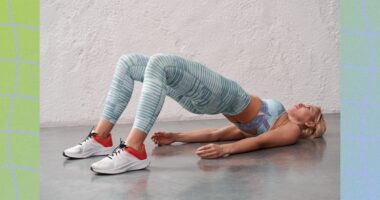
Why? It’s due to the way COVID-19 spreads, Collins says. The main way SARS-CoV-2, the virus that causes COVID-19, spreads is through respiratory droplets and small particles called aerosols that an infected person breathes, coughs, or sneezes out, per the World Health Organization (WHO). Having two layers can help catch those droplets and keep them from getting into your system. A respirator mask works in the same way. “The idea behind respirator-style masks is that they can easily capture these particles and filter them out,” Collins says. “So, they get caught in the mask and don’t make it into your lungs.”
How to boost your protection if you are the only person wearing a mask
Again, one-way masking works, but it really works when you meet certain criteria. Here are the biggies:
You need to have a high-quality mask.
“You should be wearing the highest quality mask in terms of filtration—ideally an N95, KF94, or KN95 mask,” Thomas Russo, MD, professor and chief of infectious disease at the University at Buffalo in New York, tells SELF. The CDC specifically recommends that people choose N95 masks or similar masks (like the KN95 and KF94), which filter out up to 95% of airborne particles. You do have to be careful about where you buy your masks, though, as up to 60% of the KN95 masks on the market are counterfeit, per the CDC, and it’s difficult to know if the mask you purchase is legitimate. Here are some tips for finding an acceptable mask.
Your mask needs to fit well.
Having a high-quality mask and “making sure it fits your face well” is crucial, Dr. Russo says. Gaps in your mask—which can be caused by wearing the wrong size or type of mask, or wearing a mask with facial hair—let air with respiratory droplets leak in and out around the edges, the CDC points out.
The CDC specifically recommends you do the following to ensure you have a well-fitting mask:
- Make sure it fits snugly over your nose, mouth, and chin.
- Check for gaps by cupping your hands around the outside edges of the mask.
- Make sure no air is flowing from the area near your eyes or from the sides of the mask.
- You should feel warm air come through the front of the mask and may be able to see the mask material move in and out with each breath if your mask has a good fit.
If you have a well-fitting, high-quality mask, “you will notice immediately that breathing is more difficult because you’re breathing through the mask and not around it,” Dr. Schaffner says. “That means the mask is doing its job,” he adds.
READ RELATED: Liver disease: Four warning signs the condition is now serious and life-threatening
You need to know when to throw out your mask and use a new one.
If we’re talking about surgical masks, those are considered one-and-done deals. Throw it away after each use. But when it comes to respirators, the CDC recommends checking the manufacturer’s instructions to determine how long they can be worn. A good rule of thumb for these types of masks is to throw them away when the straps become stretched out and the mask no longer fits snugly against your face, or it becomes damaged, wet, or dirty, per the CDC.
You need to feel comfortable wearing your mask.
With all the concerns about protection, it’s kind of easy to forget that a mask also has to be comfortable to wear for the duration of time you’re wearing it, Dr. Russo says. “If you have a high-quality mask and it’s not comfortable or doesn’t fit well, it defeats the purpose.” So, make sure you can handle cruising through your local grocery store or mall with your mask on in relative comfort. If not, Dr. Russo says, you may need to find a different mask.
Overall, experts stress that you should feel relatively safe if you’re masked up and no one else is. “While two-way masking with N95, KF94, FFP2, and KN95 masks is significantly better, the masks are still effective if just one person is wearing it,” Collins says.
Sources:
Related:
Source: SELF










